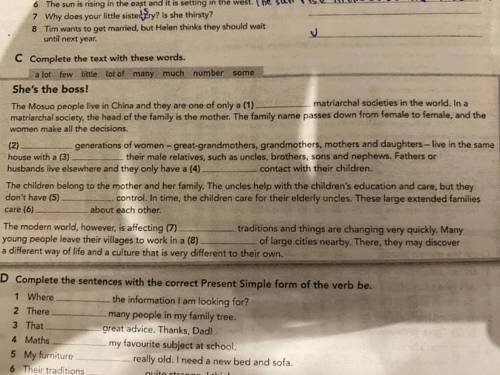C Complete the text with these words. a lot few little lot of many much number some
She's the boss!
The Mosuo people live in China and they are one of only a (1)
matriarchal societies in the world. In a
matriarchal society, the head of the family is the mother. The family name passes down from female to female, and the
women make all the decisions.
(2)
generations of women - great-grandmothers, grandmothers, mothers and daughters - live in the same
house with a (3)
their male relatives, such as uncles, brothers, sons and nephews. Fathers or
husbands live elsewhere and they only have a (4)
contact with their children.
The children belong to the mother and her family. The uncles help with the children's education and care, but they
don't have (5)
control. In time, the children care for their elderly uncles. These large extended families
care (6)
about each other.
The modern world, however, is affecting (7)
traditions and things are changing very quickly. Many
young people leave their villages to work in a (8)
of large cities nearby. There, they may discover
a different
way of life and a culture that is very different to their own.

Другие вопросы по теме Английский язык
Популярные вопросы
- До дилянки Кола з послідовно з єднаниз резисторов 6 ом 9 ом 3ом...
1 - Еди чності. ваності баніза- | ЗАПИТАННЯ ТА ЗАВДАННЯ гриско- зроз-...
1 - Көктөбе телемұнарасы. Мәтіндерге ортақ тақырыпты анықта. Көктөбе...
3 - Choose the correct variant: 1. has been workking has been working...
3 - - Якого віку чоловіків і жінок в Україні було найбільше в 2015 році?...
1 - Самостійна робота по зарубіжний література 10 клас...
1 - 1. Спектральный метод преобразования сигнала… * а .предполагает...
2 - Дайте стислу відповідь. Закінчіть речення, Твір, у якому життя відображається...
1 - 4. В уривку з повісті Стоока наче вона була, усе бачила, усюди,...
2 - Рад¡ус кола, описаного навколо правильного Чотирикутника, дорывнюэ...
1
(2) Many generations of women - great-grandmothers, grandmothers, mothers, and daughters - live in the same house with a (3) few of their male relatives, such as uncles, brothers, sons, and nephews. Fathers or husbands live elsewhere and they only have a (4) little contact with their children.
The children belong to the mother and her family. The uncles help with the children's education and care, but they don't have (5) much control. In time, the children care for their elderly uncles. These large extended families (6) care a lot about each other.
The modern world, however, is affecting (7) their traditions and things are changing very quickly. Many (8) young people leave their villages to work in a lot of large cities nearby. There, they may discover some different way of life and a culture that is very different from their own.
In this text, we were asked to complete the missing words using the given options. Let's go through each blank space and choose the appropriate word.
For the first blank (1), the correct word is "few" because it implies that there are only a small number of matriarchal societies in the world.
For the second blank (2), the correct word is "many" because it describes the multiple generations of women living together.
For the third blank (3), the correct word is "few" because it indicates that only a small number of male relatives live in the same house.
For the fourth blank (4), the correct word is "little" because it suggests a small amount of contact between fathers (or husbands) and their children.
For the fifth blank (5), the correct word is "much" because it implies a high level of control.
For the sixth blank (6), the correct phrase is "care a lot" because it conveys the strong emphasis on caring for each other within the extended family.
For the seventh blank (7), the correct word is "their" because it refers to the traditions of the Mosuo people.
For the eighth blank (8), the correct phrase is "a lot of" because it indicates a large number of young people leaving their villages.
The completed text with the missing words filled in is as follows:
"She's the boss!
The Mosuo people live in China and they are one of only a (1) few matriarchal societies in the world. In a (2) many generations of women - great-grandmothers, grandmothers, mothers, and daughters - live in the same (3) few house with a few of their male relatives, such as uncles, brothers, sons, and nephews. Fathers or husbands live elsewhere and they only have a (4) little contact with their children.
The children belong to the mother and her family. The uncles help with the children's education and care, but they don't have (5) much control. In time, the children care for their elderly uncles. These large extended families (6) care a lot about each other.
The modern world, however, is affecting (7) their traditions and things are changing very quickly. Many (8) young people leave their villages to work in a lot of large cities nearby. There, they may discover some different way of life and a culture that is very different from their own."